Liu Yong
Tailoring Generative Adversarial Networks for Smooth Airfoil Design
Apr 18, 2024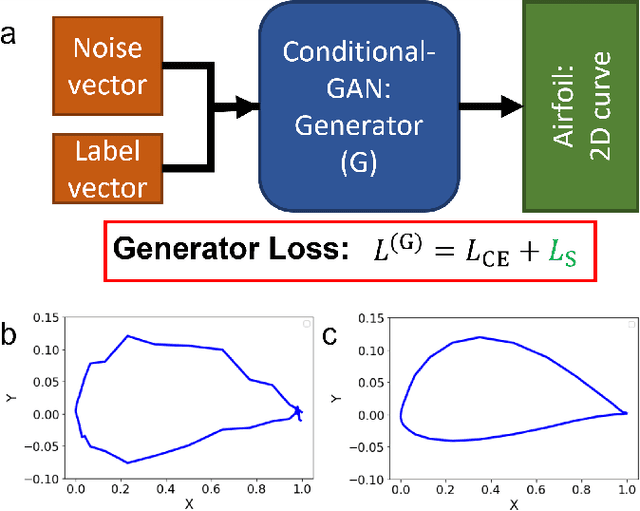

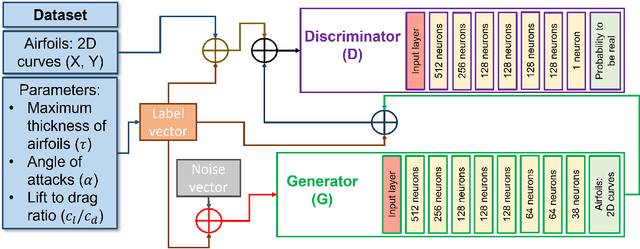
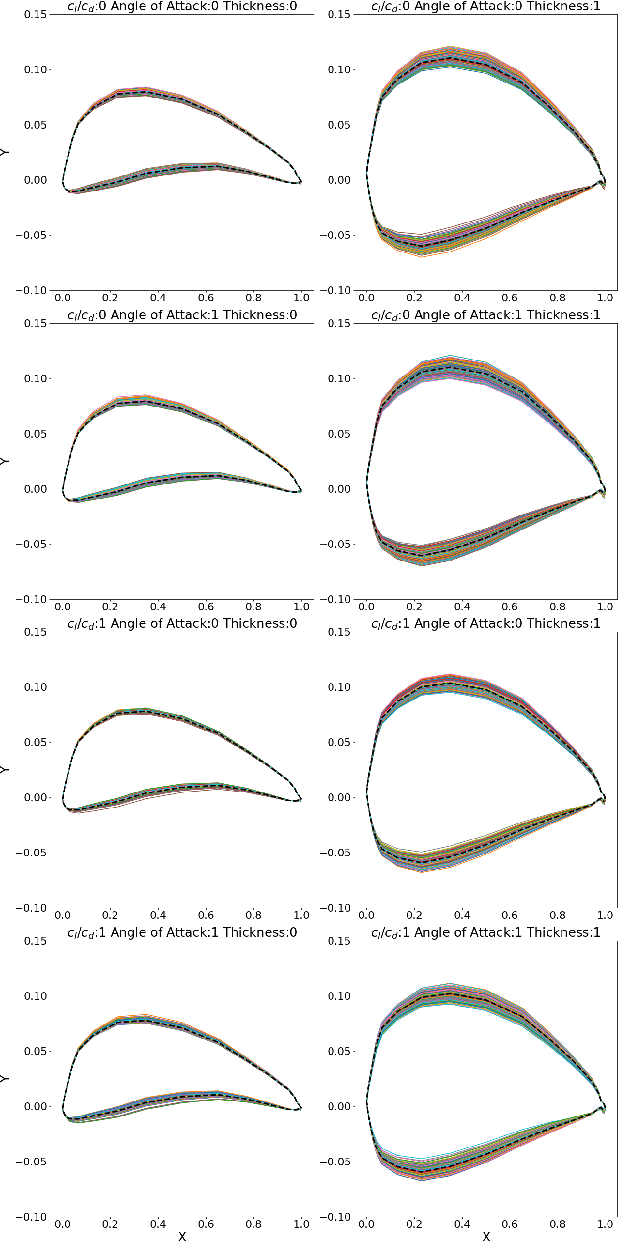
Abstract:In the realm of aerospace design, achieving smooth curves is paramount, particularly when crafting objects such as airfoils. Generative Adversarial Network (GAN), a widely employed generative AI technique, has proven instrumental in synthesizing airfoil designs. However, a common limitation of GAN is the inherent lack of smoothness in the generated airfoil surfaces. To address this issue, we present a GAN model featuring a customized loss function built to produce seamlessly contoured airfoil designs. Additionally, our model demonstrates a substantial increase in design diversity compared to a conventional GAN augmented with a post-processing smoothing filter.
Don't Forget What I did?: Assessing Client Contributions in Federated Learning
Mar 11, 2024



Abstract:Federated Learning (FL) is a collaborative machine learning (ML) approach, where multiple clients participate in training an ML model without exposing the private data. Fair and accurate assessment of client contributions is an important problem in FL to facilitate incentive allocation and encouraging diverse clients to participate in a unified model training. Existing methods for assessing client contribution adopts co-operative game-theoretic concepts, such as Shapley values, but under simplified assumptions. In this paper, we propose a history-aware game-theoretic framework, called FLContrib, to assess client contributions when a subset of (potentially non-i.i.d.) clients participate in each epoch of FL training. By exploiting the FL training process and linearity of Shapley value, we develop FLContrib that yields a historical timeline of client contributions as FL training progresses over epochs. Additionally, to assess client contribution under limited computational budget, we propose a scheduling procedure that considers a two-sided fairness criteria to perform expensive Shapley value computation only in a subset of training epochs. In experiments, we demonstrate a controlled trade-off between the correctness and efficiency of client contributions assessed via FLContrib. To demonstrate the benefits of history-aware client contributions, we apply FLContrib to detect dishonest clients conducting data poisoning in FL training.
Learning to Model Diverse Driving Behaviors in Highly Interactive Autonomous Driving Scenarios with Multi-Agent Reinforcement Learning
Feb 21, 2024Abstract:Autonomous vehicles trained through Multi-Agent Reinforcement Learning (MARL) have shown impressive results in many driving scenarios. However, the performance of these trained policies can be impacted when faced with diverse driving styles and personalities, particularly in highly interactive situations. This is because conventional MARL algorithms usually operate under the assumption of fully cooperative behavior among all agents and focus on maximizing team rewards during training. To address this issue, we introduce the Personality Modeling Network (PeMN), which includes a cooperation value function and personality parameters to model the varied interactions in high-interactive scenarios. The PeMN also enables the training of a background traffic flow with diverse behaviors, thereby improving the performance and generalization of the ego vehicle. Our extensive experimental studies, which incorporate different personality parameters in high-interactive driving scenarios, demonstrate that the personality parameters effectively model diverse driving styles and that policies trained with PeMN demonstrate better generalization compared to traditional MARL methods.
Hybrid Augmented Automated Graph Contrastive Learning
Mar 24, 2023Abstract:Graph augmentations are essential for graph contrastive learning. Most existing works use pre-defined random augmentations, which are usually unable to adapt to different input graphs and fail to consider the impact of different nodes and edges on graph semantics. To address this issue, we propose a framework called Hybrid Augmented Automated Graph Contrastive Learning (HAGCL). HAGCL consists of a feature-level learnable view generator and an edge-level learnable view generator. The view generators are end-to-end differentiable to learn the probability distribution of views conditioned on the input graph. It insures to learn the most semantically meaningful structure in terms of features and topology, respectively. Furthermore, we propose an improved joint training strategy, which can achieve better results than previous works without resorting to any weak label information in the downstream tasks and extensive evaluation of additional work.
FedUKD: Federated UNet Model with Knowledge Distillation for Land Use Classification from Satellite and Street Views
Dec 05, 2022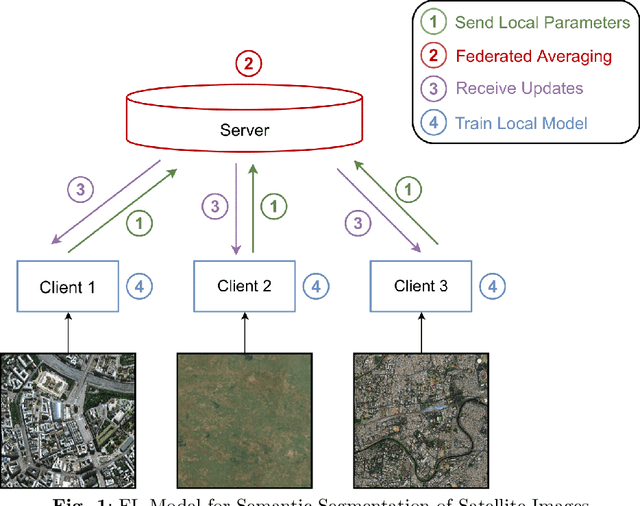

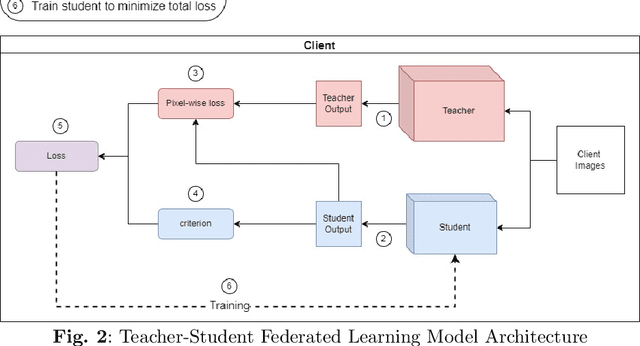
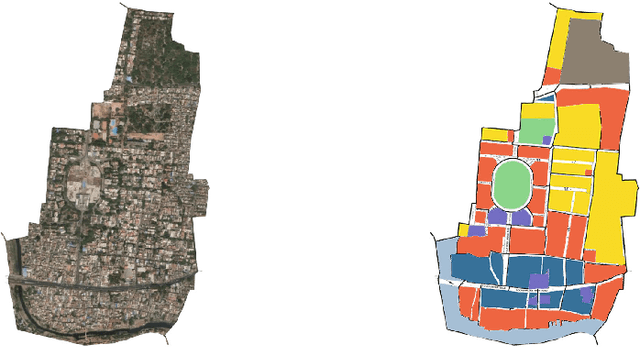
Abstract:Federated Deep Learning frameworks can be used strategically to monitor Land Use locally and infer environmental impacts globally. Distributed data from across the world would be needed to build a global model for Land Use classification. The need for a Federated approach in this application domain would be to avoid transfer of data from distributed locations and save network bandwidth to reduce communication cost. We use a Federated UNet model for Semantic Segmentation of satellite and street view images. The novelty of the proposed architecture is the integration of Knowledge Distillation to reduce communication cost and response time. The accuracy obtained was above 95% and we also brought in a significant model compression to over 17 times and 62 times for street View and satellite images respectively. Our proposed framework has the potential to be a game-changer in real-time tracking of climate change across the planet.
 Add to Chrome
Add to Chrome Add to Firefox
Add to Firefox Add to Edge
Add to Edge